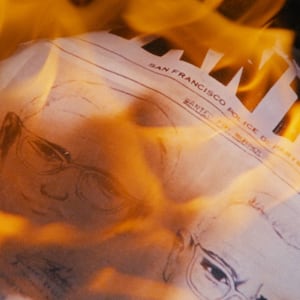Middletown asks a fundamental (and highly pertinent) question: How do you make people believe in a conspiracy theory—and take action to address it—when the conspiracy is actually true?
For the students of Upstate New York’s Middletown High School in the early ’90s, the answer was to tirelessly strive to expose the nefarious conduct and dealings that were polluting their community, and to respond to criticisms and dismissals by putting their head down and doing the arduous and noble work demanded of a real democracy. They were a David trying to fell a multi-pronged Goliath, and Boys State and The Mission directors Jesse Moss and Amanda McBaine’s documentary—which premiered at the Sundance Film Festival—revisits their battle via the countless hours of footage they shot about this crisis. What it delivers is a genuinely uplifting portrait of activism under fire.
It’s also, movingly, a tale about teachers and the life-altering impact they can have on impressionable youth. Middletown’s saga begins with Fred Isseks, a 9th-grade English teacher who, thanks to a project in which he had students photograph their world with cameras, was chosen to find a use for Middletown High’s new video equipment. His bright idea was Electronic English, an elective that let kids create whatever they wanted with camcorders. Initially, that meant rap videos and comedy skits. Yet Fred soon turned them on to a different focus: looking into the nearby Wallkill landfill, which select citizens were reporting was leaking toxic waste into their suburban neighborhood.
Fred was viewed by his colleagues and the student body as a hippie iconoclast with unconventional methods and a do-gooder environmentalist attitude. Nonetheless, the chance to investigate a potential scandal perpetrated by the big bad powers-that-be appealed to rebellious anti-establishment teens.
Before long he had a class of devoted disciples, including Jeff Dutemple, Rachel Raimist, David Birmingham, and Mike Regan, all of whom are seen in Middletown’s grainy material from the era and also sit down for candid new interviews with Moss and McBaine. As they make clear, they were innately attracted to the thought of uncovering a mystery in part because it hit so close to home, and because Fred—a lively and encouraging presence who trusted them and gave them responsibility—made them believe they were up to the challenge.
The students filmed virtually everything they did with regards to the Wallkill landfill inquiry (as well as their downtime). Consequently, Middletown is blessed with an amazing amount of ’90s-era VHS material that brings their quest to life. At Fred’s suggestion, they broke into the landfill (Fred and Rachel now admit that it was trespassing) and discovered holes in the ground out of which bubbled nasty green liquid. The area was littered with discarded barrels, medical syringes, and other assorted refuse that didn’t seem to belong.

Afterwards, they began collaborating with a Middletown resident, Donald Tirrell, whose neighbors had been directly affected by waste seeping into their cellars and yards, emitting a pungent smell (Mike refers to it as the scent of “dead bodies and decay…New Jersey”) and, they claimed, creating a scourge of fatal illnesses.
Outraged and motivated, Fred and his students set out to shine a spotlight on this crime, and Middletown depicts them interviewing everyone and anyone associated with the dumping ground, from residents to town officials to bigger media outlets, such as the editor-in-chief of the local newspaper, whose anger at being interrogated about his disinterest in their findings is the first of many instances in which the kids ruffle feathers.
Getting anyone to confess to their misdeeds was a Herculean task, but their toil did turn up shocking revelations about the design of the landfill—shamefully, it was built on the aquifer that provides Middletown with drinking water—and about the intricate ties between the waste disposal industry, town and state government, big business, and the Mongelli crime family.
Year after year, Fred and his kids attempted to make people see that something nefarious was taking place, and Middletown demonstrates that they eventually made enough noise to elicit the attention of The New York Times and 60 Minutes. As Fred now says, the entire experience was like something out of a bad movie—complete with their very own Deep Throat in the figure of the enigmatic “Mr. B.”—and he reminisces about it with not simply affection but pride at having stirred these teens to look beyond themselves and seek justice.
In an old interview, Fred explains that what began as a journalistic process became a crusade, and Moss and McBaine’s documentary underscores his articulate point that the two are often naturally and inextricably linked when the subject is an offense that’s doing grave harm to innocent people.
Fred “talked to every student as if they were an equal,” says Jeff, and the effect was, according to Mike, “transformative.” Middletown celebrates Fred and, by extension, the role teachers play in imbuing pre-adults with notions of civic involvement and duty—and, relatedly, the way in which hands-on engagement often stimulates in ways that classroom lectures and projects don’t.
There isn’t a former student of Fred’s featured in Moss and McBaine’s doc who doesn’t look back fondly at their time scrutinizing the landfill and the cover-up they believe was committed by a host of inter-related parties. Whether grilling officials or acquiring proof via Freedom of Information Act requests, they were given a chance to do something meaningful, and they seized it, ultimately revealing the many tangled connections between politicians, corporations, and the underworld—relationships that not only existed in this particular time and place but remain ever-present in contemporary America.
Middletown’s saga is a case study in disparate individuals comprehending and embracing the fact that the sole way to get things done, to make things right, and to uphold this country’s founding principles is often by taking matters into their own hands. Their somewhat clunky final documentary, “Garbage, Gangsters, and Greed” may have failed to result in lasting change, yet courtesy of Moss and McBaine’s film, their admirable work (and the lessons it imparts) lives on.









